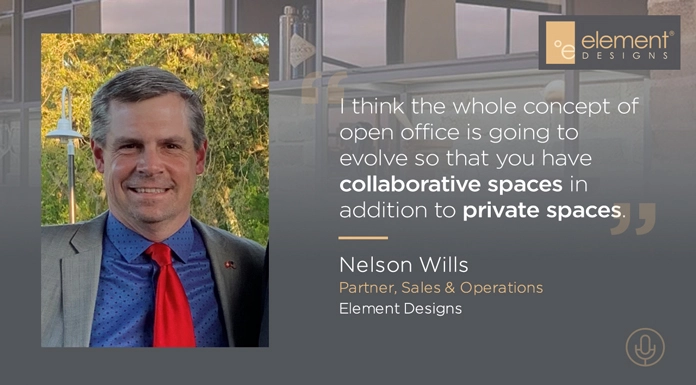Element Sessions: The Rise of “Resi-mercial” Design
Office spaces have long been attached to the stigma of being cold, grey rooms filled with an endless sea of cubicles. The design of office spaces today, though, is turning the idea that workspaces must be bland and sterile on its head.
On this first episode of Element Sessions, we were joined by Element Designs guests Beata Klecha, vice president of marketing, and Nelson Wills, partner for sales & operations design, two professionals freshly off attending NeoCon 2019, a conference that serves as the launchpad for commercial design and innovation.
We dove into how commercial design trends and changes are being implemented in real time, and what ideas we can anticipate upsetting the industry in big ways. The prevalent movement in commercial design today can be boiled down into one hybrid word: ”resimmercial.” The warmth and comfort of residential design merged with the open concept, collaborative nature of commercial design–resimmercial.
 Klecha noted the warm colors and cozy fabrics found in homes inching their way into workspaces. Wills, a NeoCon veteran, gave his insider advice on which trends are here to stay and which are passing fads. We noted how modern tech is weaving its way into furniture that includes charging docs or storage areas for devices, and how the commercial design industry is pushing open-concept, collaborative workspaces while nurturing the notion of privacy by cultivating cozy nooks for employees to find solace during a buzzing workday.
Klecha noted the warm colors and cozy fabrics found in homes inching their way into workspaces. Wills, a NeoCon veteran, gave his insider advice on which trends are here to stay and which are passing fads. We noted how modern tech is weaving its way into furniture that includes charging docs or storage areas for devices, and how the commercial design industry is pushing open-concept, collaborative workspaces while nurturing the notion of privacy by cultivating cozy nooks for employees to find solace during a buzzing workday.
The overarching sentiment pushing commercial design, however, is a need to make employees happy. After all, a happy employee is a productive employee. We unpack the question “What makes employees happy in their workspace?” today on this Element Sessions podcast.
For the latest news, videos, and podcasts in the AEC Industry, be sure to subscribe to our industry publication.
Follow us on social media for the latest updates in B2B!
Twitter – @AECMKSL
Facebook – facebook.com/marketscale
LinkedIn – linkedin.com/company/marketscale








